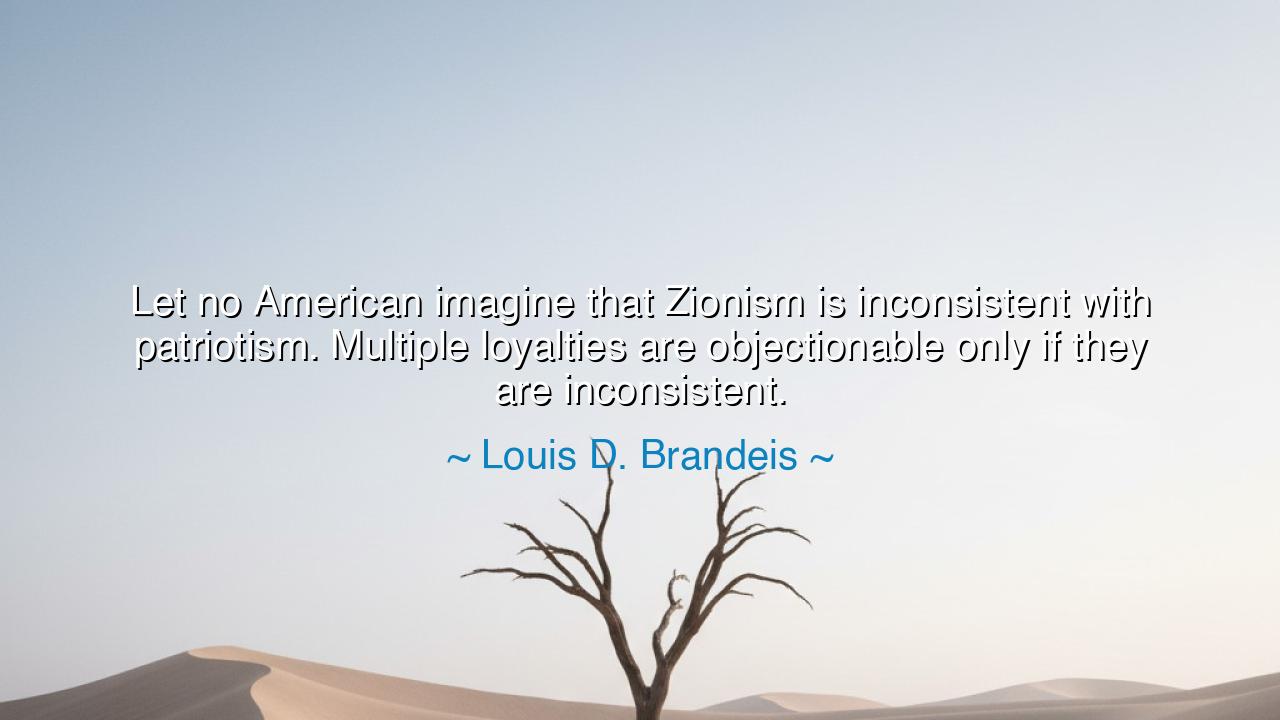
Let no American imagine that Zionism is inconsistent with
Let no American imagine that Zionism is inconsistent with patriotism. Multiple loyalties are objectionable only if they are inconsistent.






The words of Louis D. Brandeis—“Let no American imagine that Zionism is inconsistent with patriotism. Multiple loyalties are objectionable only if they are inconsistent.”—shine with the clarity of a judge and the wisdom of a prophet. Spoken in an age of doubt and suspicion, his declaration was meant to lift the burden of divided identity from those who felt torn between love for their homeland and devotion to their people. Brandeis, the first Jewish justice of the U.S. Supreme Court, proclaimed that patriotism is not diminished by belonging to more than one community, so long as those loyalties do not stand in contradiction. Instead, multiple loyalties can enrich the spirit, strengthen the nation, and unite higher ideals.
At the heart of his teaching lies the understanding that Zionism—the yearning of the Jewish people for a homeland in the land of their ancestors—did not weaken the loyalty of Jewish Americans to the United States. Rather, Brandeis argued, it deepened it. For a people who know exile, suffering, and survival, love for a land of liberty becomes all the more profound. To be devoted both to America and to the dream of Israel was not treachery, but testimony to the capacity of the human heart to love more than one home, more than one ideal, without conflict.
This truth is borne out in history. When the First World War came, Jewish Americans enlisted and fought under the American flag with courage and devotion. Their loyalty to the United States was unquestionable, even as many also labored for the Zionist cause, seeking a restored homeland in Palestine. Their service proved Brandeis’s point: multiple loyalties are not dangerous when they harmonize; they become dangerous only when they contradict. Love for America and hope for Israel were not inconsistent—they flowed from the same wellspring of faith, justice, and survival.
The ancients themselves recognized this wisdom. The Greeks often held loyalty to their city-state, yet also to the broader Hellenic identity, and still higher, to the universal ideals of reason and honor. The Romans, too, adopted gods and customs from many peoples, weaving them into their identity without seeing contradiction. In Brandeis’s teaching we hear this ancient echo: the heart can hold many devotions, and the wise man discerns which loyalties complement and which loyalties clash.
Yet his words also guard against danger. Multiple loyalties are objectionable only if they are inconsistent. A man cannot serve both justice and injustice, both freedom and tyranny, both peace and cruelty. When loyalties demand betrayal of one another, the soul is torn and the nation is weakened. But when they align in virtue—when the love of one land complements the love of another, when the devotion to one people strengthens devotion to humanity—then they become not a burden but a blessing.
For us, the lesson is clear: do not fear identity that is layered, nor loyalty that is complex. You may love your country and also love your heritage. You may serve your nation and still uphold devotion to your ancestors, your faith, your culture. What matters is harmony, not uniformity. Ask yourself always: do my loyalties build one another, or do they tear one another apart? If they build, they are righteous; if they tear, they must be examined and purified.
In daily life, this means honoring both your roots and your present. Be faithful to the land where you live and work, but do not forget the songs, prayers, and traditions of your people. Contribute to your community as a citizen, but carry with you the wisdom of your heritage. In this way, you embody the truth Brandeis spoke: patriotism is not diminished by multiple loyalties when they are just, consistent, and aligned with virtue.
Thus let his words echo across generations: Zionism and American patriotism are not enemies, but allies. Multiple loyalties are dangerous only when they clash, but when they harmonize, they ennoble the heart and strengthen the nation. Let us remember this wisdom in our time, when the world is filled with peoples of many identities. For the true measure of patriotism is not narrow exclusion, but the greatness of a love that honors every devotion consistent with justice and truth.






AAdministratorAdministrator
Welcome, honored guests. Please leave a comment, we will respond soon